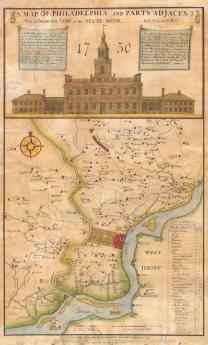
Philadephia: America's Capital, 1774-1800
The Continental Congress met in Philadelphia from 1774 to 1788. Next, the new republic had its capital here from 1790 to 1800. Thoroughly Quaker Philadelphia was in the center of the founding twenty-five years when, and where, the enduring political institutions of America emerged.
DELEGATES from the thirteen original colonies met in Philadelphia in 1774-1776 to seek a way to become full Englishmen instead of mere colonists. Failing that, some were willing to revolt from all British rule, some were not. The Monarchy, however, never retreated from its position that all such questioning of authority was treasonous, so hostilities became inevitable. Although there was agreement to work together under a 1777 draft of the Articles of Confederation, even this preliminary constitution was not finally ratified until 1781, and was in any case mostly a treaty among allied tribes rather than a national charter. Finally concluding the war in 1783, the colonies struggled for four more years to make this definition of affiliation workable.
IT was George Washington who decided in dismay that such looseness was entirely inadequate for maintaining law and order, if Shay's Rebellion in Massachusetts was any indicator. That Puritan colony which mostly stirred up the original uproar, gave signs of willingness to live in anarchy indefinitely, even with John Hancock as its governor. Washington reviewed his many frustrations attempting to defend the Confederation during its Revolution, which for him had been an eight-year nightmare of underfunding and irresolute behavior by the state legislatures. What is more, the state Legislatures now outraged creditors by debasing their currencies, offended merchants by arbitrarily dishonoring private contracts. George Washington was a soldier and a farmer, uncertain what a good constitution should say. He only knew he didn't want a King, and he didn't want anarchy.
ENLISTING young James Madison as his secret agent, Washington's wide associations during revolutionary days made him aware of widespread dissatisfaction among American leaders about factionalism, economic and monetary deficiencies, and concern that the British might recognize our weakness and reassert control. For his part, Madison's previous study of the history of earlier republics under Witherspoon at Princeton provided the two Virginians with a reasonably specific outline of what needed to be done, what needed to be avoided. Madison turned out to be an adroit politician, and Washington's personal prestige suppressed other opposition. The Constitutional Convention was composed of the most influential citizens of the colonies because they could not refuse Washington's invitation, while even the few famous resisters like Patrick Henry, were undermined by reluctance to oppose Washington openly.
EVEN so, the final 1787 Constitutional proposal was only narrowly ratified. Almost all subsequent critics confess that most of their suggested improvements would almost certainly have defeated the whole project. The capital city was moved from Philadelphia to Washington DC as a result of vote-swapping by Alexander Hamilton and James Madison acting on behalf of Thomas Jefferson in the background. Consequently, it is strikingly difficult to find statues, portraits or historical markers mentioning these three, in Philadelphia two centuries later.
JEFFERSON and Madison destroyed the Federalist Party, but the last major Federalist to survive in government was John Marshall, Jefferson's hated cousin, who had once been a devoted aide to Washington at Valley Forge, and later wrote his five-volume biography. The Chief Justice of the Supreme Court took advantage of his lifetime appointment to refashion adroitly the position of the Court within three balancing arms of government, and hence established property rights as the unwritten cornerstone of all other rights. Even William Penn could not have done it so cleverly.
WHEN Marshall died on July 6, 1835, the nation's capital had been in swampy Washington for 34 years, during none of which had Marshall been on the bench in Philadelphia. But the day of his death marked the end of the spiritual dominance of Philadelphia attitudes in the political life of the Republic, coming shortly before that other signal event, when Andrew Jackson destroyed Biddle's Bank. It is entirely fitting for traditions to record the Liberty Bell was cracked and silenced, while tolling for John Marshall's funeral.
- Causes of the American Revolution Britain and its colonies had outgrown Eighteenth Century techniques of governance. Unfortunately, both England and America lacked the sophistication to make drastic changes smoothly.
- Declaration of Independence New topic 2012-06-01 17:15:49 description
- The British Attack Philadelphia Fighting in the Revolutionary War lasted eight years; for two years (June 1776 to June 1778) Philadelphia was the main military objective of the British.
- Pacifist Pennsylvania, Invaded Many Times Pennsylvania was founded as a pacifist utopia, and currently regards itself as protected by vast oceans. But Pennsylvania has been seriously invaded at least six times.
- Revolutionary Philadelphia's Patriots All kinds of people were patriots in 1776, and many of them were all mixed up about what was going on and how they stood. Hotheads in the London Coffee House stirred up about an inoffensive Tea Act, Scotch-Irish come here to escape the British Crown, the local artisan class and the local smuggler class, unexpectedly prospering under non-importation, and the local gentry -- offended to be denied seats in Parliament like other Englishmen. Pennsylvania wavered until Ben Franklin stepped forward with a plan.
- Benjamin Franklin
A collection of Benjamin Franklin tidbits that relate Philadelphia's revolutionary prelate to his moving around the city, the colonies, and the world.
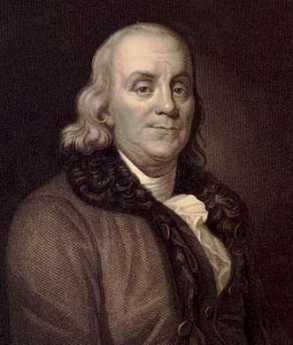
- Revolutionary Philadelphia's Loyalists History is written by the victors, so the Tory Loyalists of Revolutionary Philadelphia have mostly fallen from view.
- Bystanders to the Revolution It wasn't heroic to everyone.
- Confederation Congress, 1781-1789 New topic 2012-08-06 12:22:08 description
- George Washington in Philadelphia Philadelphia remains slightly miffed that Washington was so enthusiastic about moving the nation's capital next to his home on the Potomac. The fact remains that the era of Washington's eminence was Philadelphia's era; for thirty years Washington and Philadelphia dominated affairs.
- Articles of Confederation The Articles of Confederation were written by John Dickinson, modified by others. Officially unratified for five years, the country was ruled under them in Philadelphia, for thirteen. They taught many lessons, which we sometimes forget we had experienced.
- Robert Morris: Think Big Robert Morris wasn't born rich, or especially poor, but he was probably illegitimate. He had no recollection of his mother; his father, a tobacco trader in England, emigrated to Maryland and died rather young. It didn't take long for young Robert to become one of the richest men in America.
- Robert Morris: The Dark Side The richest man in America suddenly was locked in debtor's prison, $12 million in debt. While in prison, he reduced that to $3 million, and got released under a new bankruptcy law he helped devise.
- Robert Morris and America Robert Morris was an energetic problem-solver. In solving those problems he devised some innovative solutions which have become such axiomatic principles of a republic and its economics, that his name is seldom associated with them.
- ...Pre-Convention Events We had a varsity team, but we needed a plan.
- ...Authorship of the Constitution There were seventy invited delegates to the Constitutional Convention. Fifty-five attended the sessions, and thirty-nine signed it. We believe the main contributions were made by seven or eight men. But you can never tell, for certain.
- ..The Constitution Our Constitution was not a proclamation written by a convention. It was a negotiated contract for uniting thirteen sovereign independent states. Nothing like that had ever been done voluntarily, and few nations have matched it in two hundred years, even with the use of force.
- ..Tax and Fiscal Issues in the Constitution, Morris (1) For some founding fathers, monetary issues were all that mattered.
- ...Potential New Constitutional Amendments New topic 2012-08-01 18:50:35 description
- ...Pending and Later Amendments New topic 2012-08-01 19:06:55 description
- ..Constitution and Court Forget all those lawyer jokes you hear. The American legal profession can rightly be proud of the Federal Court System, an achievement of the whole profession. America may be legalistic and overlawyered, but that reflects the rule of law dominated by lawyers. Curiously, the leader of this creation, John Marshall, was not so much a legal theoretician as a relentless Federalist lawyer, determined to reshape the legal profession to be worthy of power.
- Shaping the Constitution in Philadelphia After Independence, the weakness of the Federal government dismayed a band of ardent patriots, so under Washington's leadership a stronger Constitution was written. Almost immediately, comrades discovered they had wanted the same thing for different reasons, so during the formative period they struggled to reshape future directions . Moving the Capitol from Philadelphia to the Potomac proved curiously central to all this.
- ...Ratification, Bill of Rights and Other Amendments The 1787 Constitution lacked a Bill of Rights. Few except Madison himself were opposed to adding one, but many other delegates would have failed election without promising it. Negotiations at the Convention had proved so excitingly innovative that time ran out before the Convention had to adjourn with only a promise of a Bill of Rights, first thing.
- ...Trying Out the New Constitution George Washington's first term as President was much like a continuation of the Constitutional Convention, with many of the same participants.
- Unwritten Constitutional Modification It is so difficult to amend the Constitution, we mostly don't do it. Our system is to have the Supreme Court migrate slowly through several small adjustments, watching the country respond. Occasionally we have imported new principles, sometimes not entirely wise ones, adopted without the same seasoning.
- Albert Gallatin A magnificent but largely forgotten man.
- Federalism Slowly Conquers the States Thirteen sovereign colonies voluntarily combined their power for the common good. But for two hundred years, the new federal government kept taking more power for itself.
- Colonial Philadelphia (Pre- 1776)
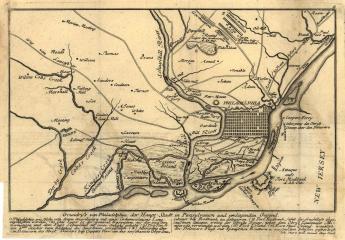 It's surprising to most Americans to learn the American Revolution was not the beginning, but almost half-way through the European settlement. And before the Revolution, there were thousands of years of settlement by non-European tribes. We know more about non-European settlers than we did fifty years ago, but records are still very poor or non-existent, and not likely to catch up very rapidly. History will begin in 1492 for a very long time. Long before that, it isn't history, it's anthropology.
It's surprising to most Americans to learn the American Revolution was not the beginning, but almost half-way through the European settlement. And before the Revolution, there were thousands of years of settlement by non-European tribes. We know more about non-European settlers than we did fifty years ago, but records are still very poor or non-existent, and not likely to catch up very rapidly. History will begin in 1492 for a very long time. Long before that, it isn't history, it's anthropology.
- Arch Street: from Sixth to Second When the large meeting house at Fourth and Arch was built, many Quakers moved their houses to the area. At that time, "North of Market" implied the Quaker region of town.
- Connecticut Invades Pennsylvania! Connecticut once waged three serious wars with Pennsylvania, and we don't even remember it. But politicians noticed that all became peaceful after we united into a single nation. Others noticed the Articles of Confederation were strong enough to cope with invasions by neighbor states. The two proprietorships of New Jersey taught some smaller lessons. Virginia taught still other lessons.
- Military Philadelphia .
- New Jersey (State of)
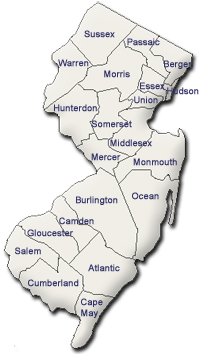 The Garden State really has two different states of mind. The motto is Liberty and Prosperity.
The Garden State really has two different states of mind. The motto is Liberty and Prosperity.
- Haddonfield (all 26)(1 of1)volume 38
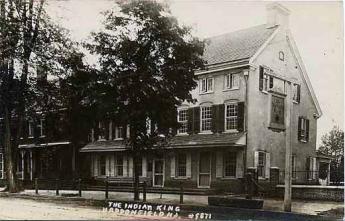 Haddonfield is a bit of a secret. It's Philadelphia's "Main Line, East"
Haddonfield is a bit of a secret. It's Philadelphia's "Main Line, East"